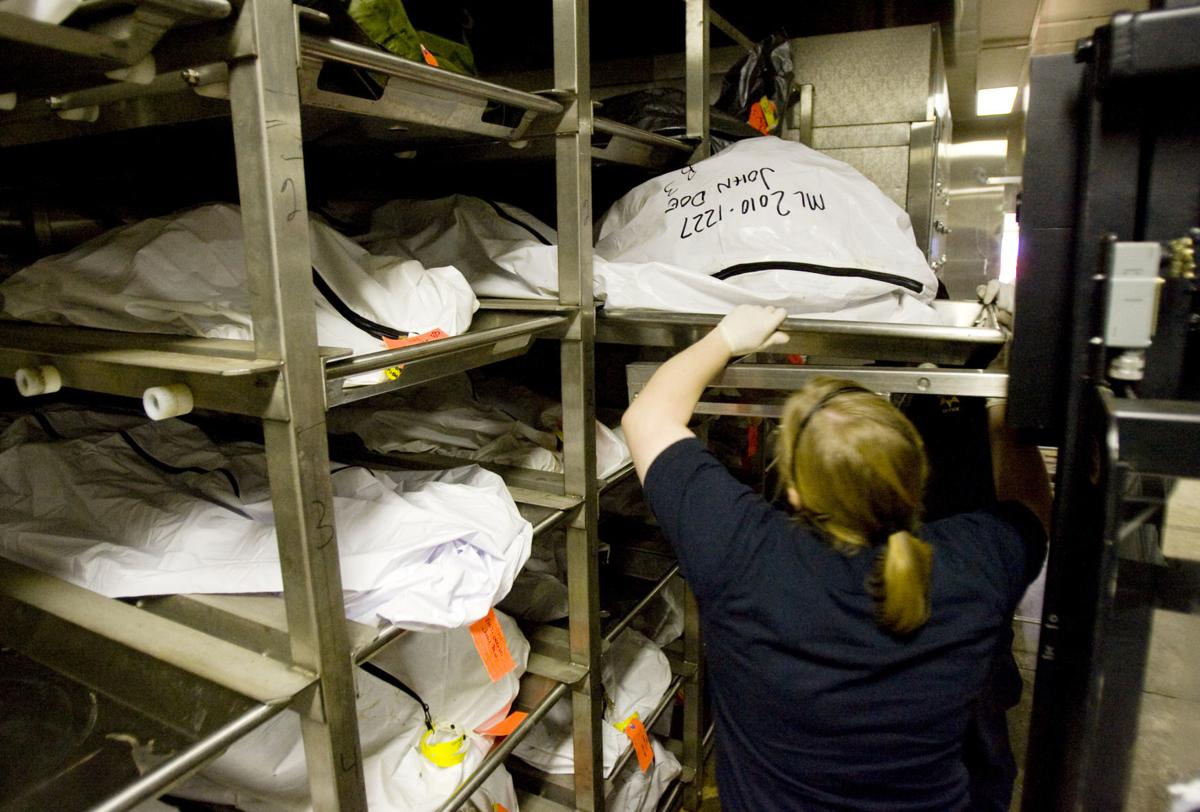The situation has gotten scary at Carrillo’s Tucson Mortuary, says April Seybert.
For the last few weeks, the family-owned funeral home that’s been serving Tucsonans for over a century has been doing two funerals and two cremations a day. It has handled 50 more funerals this year than it did at the same point last year.
The funeral home’s collection of about a dozen-and-a-half cooler and table spots have remained at capacity.
“We’re really close to running out of room to where we’d have to turn families away,” said Seybert, the general manager. “To those that don’t think (the virus) exists, it’s here.”
The mortuary reached out to three other funeral homes in Tucson for storage help and were told by two of them that they, too, were at capacity, she said. They looked into getting a refrigerated truck to store bodies, similar to what was done in New York City as coronavirus deaths surged there earlier this year.
On Friday, she reached out to both the state’s funeral board and the county Health Department for help.
The latter announced later in the day that it is making available up to 150 spaces in the Office of the Medical Examiner’s morgue to help hospitals, funeral homes and mortuaries that have reached or neared capacity.
“Thankfully the Medical Examiner’s Office came through,” she said. “It’s difficult times. It’s a strange world we’re living in right now.”
Pandemic a toll on “last responders”
The limited space for body storage throughout the state — in Pima County, but also in Maricopa County, according to news reports — represents another critical moment in Arizona’s attempt to slow the spread of the coronavirus in what’s become one of the world’s worst virus hot spots.
The Arizona Department of Health Services has reported 273 new deaths statewide from the virus since Monday, some new and some through a process called death certificate matching. There have been a total of 2,082 deaths in Arizona, including 313 in Pima County, as of Friday.
In a news release, Pima County officials acknowledged that capacity has been an issue in the past few weeks but said that wasn’t primarily a result of people dying from the virus. Instead, that was due to a slower funeral process, as limits have been placed on the size of gatherings and travel, officials said.
The release notes that Pima County does not anticipate long-term storage of remains will be necessary.
“The Pima County Health Department said the need for the county to provide relief for some hospitals and funeral homes is not associated with any known surge of COVID-19-related deaths — the County reported no COVID-19 deaths yesterday — but instead appears tied to backlogs in the funeral industry,” the Friday release said.
Seybert disagreed with the county’s notion that the lack of capacity is a processing issue, pointing to the simple fact that mortuaries are doing more funerals this year than the last. She said she doesn’t have data on the percentage of funerals she handles that were coronavirus deaths.
“It’s not a processing issue. I have two hearses here. I’m doing funerals daily. I’m doing two cremations daily. I can’t keep up,” she said.
She said she’s thankful for the help but admitted she’s stressed out by the situation in general. She said helping families trying to mourn their loved ones amid the pandemic has been “horrible.”
“Funerals are horrible anyway,” she said. “It’s stressful. It’s horrible for the families. They can’t grieve they way they should grieve.”
She said it’s also taken a “toll on us as workers,” adding that she feels they’ve been forgotten in the conversation about essential employees, referring to her and her staff as “last responders.”
“Everyone is afraid of the virus. We’re afraid of the virus,” she said. “If one us was to get infected, we’d have to shut down the place.”
At Adair Funeral Homes, officials acknowledged their business has been steady and slightly above then what’s typical during past years, adding that there has not been a surge in demand for services due to coronavirus-related deaths, according to spokeswoman Lynette Viviani.
She said “thankfully” the funeral home has not had any capacity issues and currently has no plans to utilize the overflow space at the medical examiner’s office.
“We are, however, in the process of constructing an additional refrigeration facility at our Dodge Chapel, which will provide extra capacity by the end of the month. This addition is part of a long-term plan that was in place well before the COVID-19 outbreak,” Viviani said.
Hospitals: COVID-19 patients on the rise, Deaths not so much
Tucson hospitals reached by the Star on Friday said their morgue capacity has not been an issue, but that they are prepared to use the Medical Examiner’s Office in the future should the need arise.
“In line with state trends, we have seen a slight increase in deaths over the past few weeks, but we have also had many more patients recover after the lifesaving care our staff has provided to them,” said Veronica Apodaca, a spokeswoman for Northwest Medical Center and Oro Valley Hospital, in a statement.
Rebecca Ruiz McGill, a spokeswoman for Banner, said Banner still has morgue capacity at its Tucson facilities but has “contingency plans in place should we exceed that capacity.” She added that they have not seen an increase in deaths in recent weeks and do not plan to use the option provided by the county.
Tucson Medical Centeracknowledged a recent surge in COVID-19 patients, but not an increase in deaths, according to spokeswoman Angela Pittenger.
“The medical examiner opening space for storage of bodies is a contingency plan should we reach that point,” she said.
The available space in Pima County’s morgue is typically used for the work the Medical Examiner’s Office has been doing for years to identify and repatriate the remains of migrants who died crossing the U.S.-Mexico border. Remains come to the facility from several Arizona border counties, including Pima.
Since the start of 2020, the medical examiner has received 96 sets of remains believed to belong to migrants who died while crossing the border in Southern Arizona, according to an online database maintained by the humanitarian aid group Humane Borders and the Medical Examiner’s Office.
In 2019, the office received 148 sets of remains. By July 10, 2019, the office had received 77 sets of remains.
Photos for May 29: Tucson gets by during Coronavirus Pandemic
Tucson gets by during coronavirus pandemic
Updated
The iconic Casa Molina bull and matador statue both sport masks on the first full week of the loosening of COVID19 restrictions, May 23, 2020, Tucson, Ariz. The bull previously had a mask on the testicles.
Tucson gets by during coronavirus pandemic
Updated
Michelle Leon Cordova, right, mother, and her son Sahuarita High School senior Lino Cordova, whom is fighting cancer, wave at staff members from Diamonds Children Center, friends and the Marana Police Department during a car parade, celebrating Lino's graduation, outside of his home on May 13, 2020 in Sahuarita, Ariz. Cordova stood on the sidewalk while the team from Diamond Children Center, friends and the Marana police department gave Cordova a graduation gar parade. Cordova was given a gift basket with his favorite snacks, gift cards as well as other items he enjoys. The car parade, also, celebrated another graduating senior fighting cancer from Empire High School, Noah Nieto. Nieto, also, received a gift basket with snacks, gift cards and other items Lino enjoys.
Tucson gets by during coronavirus pandemic
Updated
Michelle Leon Cordova, right, mother, brings celebration balloons to a car after staff members from Diamonds Children Center, friends and the Marana Police Department celebrate Sahuarita High School senior Lino Cordova, whom is fighting cancer, graduation with a car parade outside of his home on May 13, 2020 in Sahuarita, Ariz. Cordova stood on the sidewalk while the team from Diamond Children Center, friends and the Marana police department gave Cordova a graduation gar parade. Cordova was given a gift basket with his favorite snacks, gift cards as well as other items he enjoys. The car parade, also, celebrated another graduating senior fighting cancer from Empire High School, Noah Nieto. Nieto, also, received a gift basket with snacks, gift cards and other items Lino enjoys.
Tucson gets by during coronavirus pandemic
Updated
Personnel from Tucson Medical Center line the heliport to watch A-10's from Davis-Monthan Air Force Base's 355th Wing and F-16's from the Arizona Air National Guard's 162nd Wing make a pass over the facility, one leg of an area wide community flyover, May 14, 2020, Tucson, Ariz.
Tucson gets by during coronavirus pandemic
Updated
Nancy Celix-Campos, right, a respitory therapist at Tucson Medical Center, watches the military flyover with her daughters, Giana, 12, and Jazmyn, 8, from Sentinel Peak on May 14, 2020. Two F-16 Fighting Falcons from Arizona Air National GuardÕs 162nd Wing and two A-10 Thunderbolt II's from the 355th Wing, assigned to Davis-Monthan Air Force Base, fly over Tucson area hospitals to honor healthcare personnel and first responders as they are some of the frontline workers dealing with the coronavirus disease (COVID-19) head on. "It's been an exhausting two to three months," says Campos, "it's pretty cool, I like how they're going by each hospital."
Tucson gets by during coronavirus pandemic
Updated
Two F-16 Fighting Falcons from Arizona Air National Guard’s 162nd Wing and two A-10 Thunderbolt II's from the 355th Wing, assigned to Davis-Monthan Air Force Base, fly over Northwest Medical Center north of Tucson on May 14, 2020.
Tucson gets by during coronavirus pandemic
Updated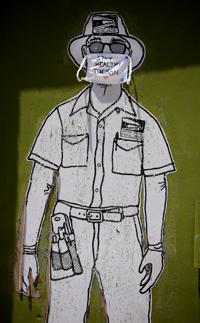
A letter carrier portrait on the Ok Market building, located in the Armory Park neighborhood, is adorned with a face mask on May 18, 2020.
Tucson gets by during coronavirus pandemic
Updated
Rosemary Garcia waits for a family member outside of a store at Park Place Mall, 5870 E. Broadway Blvd., in Tucson, Ariz. on May 19, 2020. Malls reopened today under CDC guidelines and Gov. Ducey's new rules for businesses due to the Coronavirus pandemic. Park Place Mall has signs throughout the mall reminding customers to keep a six feet distance as well as hand sanitizer stations near each entrance. About half of the tables in the food court have been removed to allow for social distances as well as less than half of the stores have opened with new guidelines. Of the stores open, only 10 customers are allowed to shop in each store at a time.
Tucson gets by during coronavirus pandemic
Updated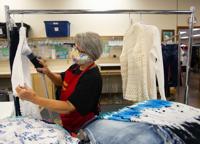
Pat Schlote steams clothing before it is put on the sales floor at the Golden Goose Thrift Shop in Catalina, Ariz., on May 21, 2020.
Tucson gets by during coronavirus pandemic
Updated
Ada Contreras, teaching assistant, looks through containers while reorganizing toys at Herencia Guadalupana Lab School, 6740 S. in Tucson, Ariz. on May 21, 2020. As Child care centers begin to re-open when they are ready, Herencia Guadalupana Lab School is reorganizing and cleaning everything in the facility before re-opening on June 2. To allow for social distancing and decrease the amount of items children touch, Herencia Guadalupana Lab School has sheds where items will go as well as placing items in containers organized by category.
Tucson gets by during coronavirus pandemic
Updated
Jen Martinez, right, softball coach, teaches Skylar Reilly about hitting during a session at Centerfield Baseball Academy, 5120 S. Julian Dr., in Tucson, Ariz. on May 21, 2020. After re-opening on Monday, Centerfield Baseball Academy has implemented new policies in response to the Coronavirus Pandemic such as wearing masks, cleaning, signage, hand sanitizer and limiting the amount of people inside the facility.
Tucson gets by during coronavirus pandemic
Updated
Karl Bosma, left, and George Cantua, with facilities and maintenance, lay down stickers to mark six-foot separation distance around one of the baggage carousels, part of the efforts at Tucson International Airport to work within the restrictions of COVID19, May 22, 2020, Tucson, Ariz.
Tucson gets by during coronavirus pandemic
Updated
A lone passenger waits for a flight near one of the shuttered restaurants in the B Gates before Memorial Day at Tucson International Airport on May 22, 2020.
Tucson gets by during coronavirus pandemic
Updated
Drew Cooper on the stage in the St. Philip's Plaza courtyard, May 22, 2020, Tucson, Ariz., where live music is back on the schedule.
Tucson gets by during coronavirus pandemic
Updated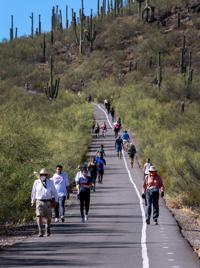
Many people visit Tumamoc Hill during the first day of Tumamoc's re-opening in Tucson, Ariz. on May 25, 2020. After being closed due to the Coronavirus pandemic, Tumamoc Hill re-opened with some modifications. There are hand sanitizer stations throughout the hike to the top as well as arrows, spaced 10-ft apart, lined up and down the hill. Some runners, hikers and walkers are also wearing masks during their hike. "The steps we are taking aim to provide our community with needed exercise, connection to our beautiful desert and a sense of comfort in such a trying time, while balancing the fact that gathering as a community endangers each of us and our loved ones. This is an unprecedented challenge that we are taking extremely seriously," said Benjamin T. Wilder, director of Tumamoc Hill. Visitors are also asked to limit their group to three people and to not touch the gate at the top of the hill- a tradition for some who make it to the top. "This is a time when we need to establish new traditions and adapt in a creative manner that embraces empathy, unity, care and patience," Wilder said.
Tucson gets by during coronavirus pandemic
Updated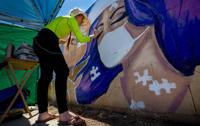
Pen Macias, artist, works on part 2 of a mural for a client on E. Broadway Rd., between S. Columbus Blvd. and S. Alvernon Way, in Tucson, Ariz. on May 25, 2020. Macias, known as The Desert Pen, has been working on her clients mural for the past three months. "It's the one thing I love, I have a passion for and the only thing I could be happy doing," said Macias. The mural represents her client, a single mother of four who works in the health care field. One half of the mural is dedicated to the connection between mothers and their children. The other half is dedicated to the connection between nurses and patients. The client wanted some positivity in the mural to show how nurses give a piece of themselves to their patients hence the puzzle pieces in the nurse and the patients, said Macias.
Tucson gets by during coronavirus pandemic
Updated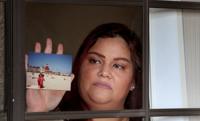
Christina Cortinas, posing at her home, May 28, 2020, Tucson, Ariz., with a photo of her and her mother, Catherine Rodriguez, in San Diego, 1991. Rodriguez is currently in assisted living and fighting COVID19. Cortinas hasn't seen her mother in months, the longest such span in her life.
Tucson gets by during coronavirus pandemic
Updated
Ruben Lopez looks through handouts while attending a Eviction Resource Fair with his family outside the Pima County Justice Court.



